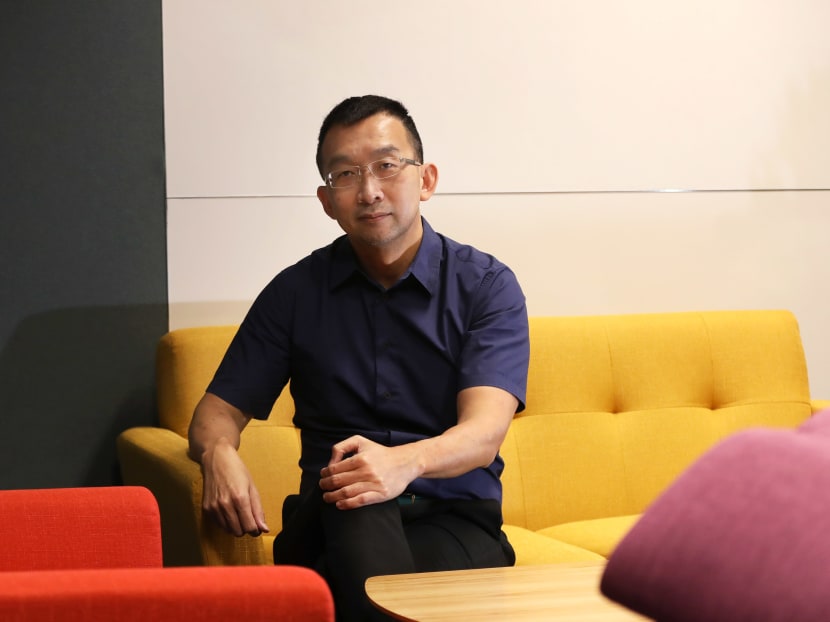Up Close With… Associate Professor David Lye, infectious disease expert
In this instalment of Up Close With, TODAY's Tessa Oh speaks to Associate Professor David Lye, an infectious disease specialist who has been in the spotlight lately.

Dr David Lye, director of the infectious disease research and training office at the National Centre for Infectious Diseases, made news in recent months after he put up three Facebook posts on Covid-19.
In this series, TODAY’s journalists meet the people behind the headlines.
In this instalment, Tessa Oh speaks to Associate Professor David Lye, an infectious disease specialist who has been in the spotlight lately.
Assoc Prof Lye, director of the infectious disease research and training office at the National Centre for Infectious Diseases (NCID), made headlines in recent months after he put up three Facebook posts on Covid-19. The first in May warned that the pandemic here was likely more dangerous than early last year. The second came after some doctors raised concerns about messenger ribonucleic acid (mRNA) vaccines approved for use in Singapore.
In his latest message on June 28, he hit back at a group of doctors who penned an open letter calling for a halt to Singapore’s vaccination programme for young boys.
Speaking to TODAY on June 23, Assoc Prof Lye, 50, talks about managing the pandemic at NCID and why it is important for doctors to speak up against misinformation during a crisis.
Excerpts of the interview below have been edited for length and clarity.
Tessa: Tell us how you got into this field. Was your family supportive of your choice of becoming a doctor and, specifically, an infectious disease specialist?
David: I really find germs fascinating... So, for example, we have resistant bugs like tuberculosis and MRSA (methicillin-resistant Staphylococcus aureus, a bacterium that causes infections in different parts of the body). And then we have new bugs — we had the Nipah virus in 1999, we had Sars (the severe acute respiratory syndrome) in 2003, and now we have Covid in 2019. It is fascinating.
I am always learning and it is professionally satisfying. Now, of course, just like all my colleagues have similar experiences when they chose their specialty, their family would naturally be a bit anxious. But I needed to do what excites me, and I reassured them by saying that (infectious diseases) is one of the safest specialties because we know what precautions to take to protect ourselves.
Tessa: NCID was created with the purpose of managing an outbreak on the scale of Sars. With Covid-19, its facilities have been put to the test. How has it been as a director at NCID, being at the forefront of the crisis? Could you give us a glimpse into what it was like early last year when the severity of the disease became known?
David: As we started to build NCID, we were always wondering what the use case (for the hospital) would have been. Definitely, the Covid-19 pandemic reinforced very clearly in our mind what NCID is all about.
And, in February and March last year, before people knew that (the pandemic) was going to be bad… I remember working days on end, looking after those initial patients. It was a new disease, there was limited information published from overseas, and we were learning from them to guide future management of the disease... All my colleagues worked very hard and, even on weekends, we never stopped. I started taking weekend breaks only sometime in September last year.
But, of course, my role was to coordinate Covid-19 research. We convened the workgroup one day before the first case arrived. It was quite serendipitous. Together with doctors from across the different hospitals, scientists from the different medical schools, and A*Star (the Agency for Science, Technology and Research), we learnt a lot about the virus in a short time, in diagnosis and treatment, and later about long-term immunity, and now on immunity from vaccination.
Lastly, I was nominated to work with a very small group of very talented people from the Economic Development Board, A*Star and the National Healthcare Group to review and recommend promising treatments and vaccines for Singapore… That has been a great experience.
Tessa: What is a typical day for you and how do you unwind?
David: There were a lot of patients. Even for someone like me, as director of research and training, I would still see patients every day. We all have to pull our weight to make sure that everything works. But, because my work still has to focus on coordinating research, there were a lot of meetings with partners locally and overseas.
I am on the (Ministry of Health’s) expert committee on Covid-19 vaccination, so there’s also a lot of tense, regular meetings and discussions. To see the vaccination rate go up in the last couple of months is really rewarding.
How do I cope with this? Like everyone else, I eat because I am stressed. And, because I love to eat, I need to exercise. I run a lot during the lockdown periods and it keeps me sane. It also allows me to eat more.
Tessa: Singaporeans would have known you through your public posts on Covid-19. Could you tell us why you decided to go public with your views?
David: The first post was private. I kept hearing my friends complain about Phase Two (heightened alert) and, when I went out, what I saw was as if nothing had changed. But I also knew, working on the ground, that we are facing a new variant… And if we continue to not curb our socialising, then (the coronavirus) will tend to multiply.
The second post was a bit different. Friends and even patients were sending me those messages (by a group of doctors calling on parents not to vaccinate their teenage children and the Government to stop administering mRNA vaccines, and instead, use the China-made Sinovac jab) and the petition (asking the Government to include Sinovac in the national vaccination programme). They asked me why and what was behind it.
(Those doctors) were against two of the most highly effective and safe vaccines, and campaigning for vaccines yet to be authorised as well as medications for parasites that international expert groups have recommended only be used in the context of a clinical trial.
Of course, if it was done by a member of the public, we can dismiss it. But some of them are doctors who are generally trusted and respected by the public.
It is always okay to have personal opinions… But if we go out there to misinform the public or try to encourage practices that are not proven... that becomes an issue.
Tessa: Your posts garnered much attention and were shared widely. How did you feel about the response, both from the public and from other medical professionals?
David: After the first one, it was quite unnerving because I got a lot of messages via Facebook Messenger as well as email from members of the public, trying to verify the post because it was private and people could not see it.
I do not know how the public felt about (the second post)... but several friends came to me concerned about how I felt because there were negative comments left on my Facebook page and other media platforms… I often have to reassure my friends and colleagues that I do not feel anything because I expected the negative comments.
Initially, I tried to educate, because some people sounded like they wanted to learn. But I realised that it was just the bait that these anti-vaccine people usually (dangle), because in reply, they would reiterate the same things… quoting the same dubious scientists from overseas. So there was no point in continuing the discussion.
It is not my plan to convince them. My plan is to educate the public, and I wish these anti-vaccine people all the best.
Tessa: Do you think these kinds of discussions in the public sphere are productive? Should these conversations be taking place behind closed doors instead?
David: I do not think there is any way of controlling this… In some ways, we will need to adjust to this new age of social media and be ready to respond when necessary.
Generally, I am for freedom of information. But here, I am fearful of the impact of misinformation at this critical time… This pandemic is like no infectious disease we have known… My perspective (is that) we do need to learn better how to communicate facts.
Tessa: Do you think conspiracy theories about vaccines and the anti-vaccine movement will continue to be a problem even after the pandemic is over, and therefore, affect people’s impressions of other vaccines?
David: It is hard to say. It is definitely something that we have to be very mindful of. If we successfully vaccinate a large number of our society, and people become convinced that it really works… it may help vaccination in future because then people will realise that when the doctor talks to them about the flu vaccine or pneumonia vaccine, it may reinforce the benefits.
Tessa: In May, you warned that the Covid-19 situation was likely more dangerous than just before the circuit breaker last year, given that many community cases were unlinked and the spread involving mutant strains could be “wide and far”. We have emerged from our first heightened-alert phase, with infections under control. What is your take on the trajectory of the pandemic henceforth?
David: Definitely, I'm much happier now… (But) can I be certain that we'll be fine in the next few weeks, the next few months?... I am not so sure.
The thing that is a bit different now… is the Delta variant. And it won't be the last variant. We know from the United Kingdom’s reports that this variant is definitely more transmissible and there is increased risk of hospitalisation in the UK... But the good news from the UK is that the vaccines work. They protect against hospitalisation and severe disease. Therefore, getting ourselves vaccinated using the most effective vaccine is highly important.
So, yes, we are in a better situation, but this is not the time to not wear a mask and then say “okay, we have enough people getting vaccinated, I will take my time”, because herd immunity means that everyone needs to do their part.
Tessa: In late May, Prime Minister Lee Hsien Loong said that Singapore must be prepared to live with an endemic Covid-19 as the coronavirus will likely not disappear completely. What will a Singapore living with an endemic disease look like?
David: (An endemic Covid-19 will happen) once we reach the height of vaccination and, at this stage, I will put it at somewhere between 80 and 90 per cent, depending on the variant. A more infectious variant will possibly require a higher level of protection.
(By then), the majority of us will have very mild or no symptoms. The ones who will get sick are those who don’t want to get vaccinated or get vaccinated with less effective vaccines.
We know, however, that there is a group of people with poor immunity, for example, people with cancer and those who have medication to suppress the immune system, because they need to for their underlying condition.
We still vaccinate them, because some protection is better than none. These people may become sick. But, if they get sick, our hospitals are not swamped... and we can look after them — not just NCID but every hospital can look after them very well. And now, after many large clinical trials, we have a lot of medications that are effective in treating Covid…
Slowly, borders will open, some restrictions will go off. Most of us will not get sick and we may not even know that we have Covid. A few people will, however, get sick. And they will get into hospitals and they will get bad pneumonia, and the doctors will treat them.
So it sounds like the seasonal flu.
That's the future I can imagine. I will definitely still wear masks when I am in crowded situations. And we have to watch out for new variants and the vaccines may be adjusted. At this stage, that is the best scenario I can imagine in the next six to 12 months.








